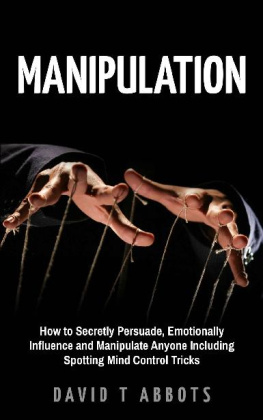Manipulation
How to Secretly Persuade, Emotionally Influence and Manipulate Anyone Including Spotting Mind Control Tricks
David T Abbots
Copyright 2018 by David T Abbots - All rights reserved.
The follow eBook is reproduced below with the goal of providing information that is as accurate and reliable as possible. Regardless, purchasing this eBook can be seen as consent to the fact that both the publisher and the author of this book are in no way experts on the topics discussed within and that any recommendations or suggestions that are made herein are for entertainment purposes only. Professionals should be consulted as needed prior to undertaking any of the action endorsed herein.
This declaration is deemed fair and valid by both the American Bar Association and the Committee of Publishers Association and is legally binding throughout the United States.
Furthermore, the transmission, duplication or reproduction of any of the following work including specific information will be considered an illegal act irrespective of if it is done electronically or in print. This extends to creating a secondary or tertiary copy of the work or a recorded copy and is only allowed with express written consent from the Publisher. All additional right reserved.
The information in the following pages is broadly considered to be a truthful and accurate account of facts and as such any inattention, use or misuse of the information in question by the reader will render any resulting actions solely under their purview. There are no scenarios in which the publisher or the original author of this work can be in any fashion deemed liable for any hardship or damages that may befall them after undertaking information described herein.
Additionally, the information in the following pages is intended only for informational purposes and should thus be thought of as universal. As befitting its nature, it is presented without assurance regarding its prolonged validity or interim quality. Trademarks that are mentioned are done without written consent and can in no way be considered an endorsement from the trademark holder.
Table of Contents
Introduction
Manipulation is primarily the art of getting people to do precisely what you want them to do without focusing on their needs and desires, and in extreme cases, even causing them harm. However, though manipulation has majorly negative undertones, it can be used for persuading and influencing people. It can consist of a series of techniques like charisma, trickery, misinformation, hypnotism, and wordplay.
The prime objective of manipulation is to trick people into doing what you want them to do without them realizing that they are being manipulated or being led into doing something. Sometimes, manipulation can be used to accomplish a positive outcome by turning the game when nothing else seems to be working.
For example, let's say you are due for a promotion and pay hike after working hard for your organization, but the firm just won't relent. When logical and other straight techniques don't work, you may have to resort to manipulation to get your stingy employers to give you your due. In such situations, manipulation is used constructively to accomplish a positive goal when you cant break through another persons unreasonableness or stubbornness.
Knowingly or unknowingly, weve been practicing manipulation even before we started speaking. Babies want to be fed, kept clean, and put to sleep. Toddlers cry for toys until the parents give in. As an adolescent, we manipulate people to go on dates with us.
Manipulation originates from the primary belief that your requirements or desires come before everyone else's. For the manipulator, the world revolves around their needs and desires. However, manipulation can be lent a more positive angle when it is used to align you and other people's needs.
Unlike persuasion or influence, manipulation happens at a more subconscious level. It is done to change an individual's primary beliefs, feelings, and experiences for getting them to do what you want. It can be accomplished by using a range of techniques from verbal and non-verbal communication to hypnotism to smooth seduction techniques. Manipulation is essentially distorting an individuals perception of reality. The manipulator gets people to think in the direction he/she wants to.
If youve read Shakespeares tragedies such as Othello or Macbeth, manipulation forms the central theme of their plot. The ingenious playwright understood manipulation in relationships, politics, and leadership even before there was a popular term for it.
In Othello, the villain Iago employs a bunch of vicious psychological tricks, including deception and craftily planned scenarios to get Othello to suspect his trusted chief
lieutenant Cassio so Iago can replace him. Lago creates a complex plot that leads Othello to believe that his ladylove Desdemona is cheating on him with the lieutenant. The villain uses his knowledge of psychology to climb his way into power by manipulating peoples thoughts and circumstances to suit his quest for power.
Macbeth is another popular Shakespearean tragedy that is based on the theme of manipulation. Lady Macbeth manipulates her husband using several psychological techniques to eliminate King Duncan and proclaim himself the ruler of the mighty Scottish throne. Macbeth then goes on a murderous rampage to protect himself from suspicion and enmity, which presents him a tyrant. The bloodbath ultimately led to the downfall and end of Macbeth and Lady Macbeth.
Lady Macbeth and the witch sisters use a series of manipulation strategies throughout the classic to instigate and encourage Macbeth into performing inhuman acts that eventually led to his doom. They manipulated Macbeth into thinking that he alone is capable of ruling the land, thus planting seeds of ambition, power, and hatred, which caused his and Lady Macbeth's end.
Is it possible to manipulate constructively or positively?
Yes, manipulation can be used positively and negatively depending on the end resultthink about manipulating a perennially depressed person into seeing a counselor after failing to persuade him/her through other means. Then, imagine manipulating a drug addict or alcoholic into giving up the substance or alcohol. That isnt too bad, is it? You are using supposedly negative techniques to accomplish a positive goal.
Positive manipulation or persuasion/influence has been going on for ages. Religious leaders, political bigwigs, and social reformers attracted people like magnets through manipulation with their positive energy, ideas of humanity, equality, and brotherhood. That wouldnt qualify as tricky manipulation. They influenced people with their positive ideas, personalities, and examples to learn important life lessons.
There are multiple times in your life when youve wanted to transform someones life for good. Yet, people may turn down your straight attempts to reach out to them owing to many reasons. In such cases, persuading or influencing people through the use of trickery or manipulation to fulfill a positive end for their own benefit may not be so bad. Irrespective of the techniques you use, your tactics cannot be termed devious or crafty.
Sometimes desperate times do indeed call for desperate measures. Using straightforward approaches may not work all the time. The only way you can get someone to do something is by using backhand techniques. Your objective isnt to get the person to do what you want to fulfill a personal agenda. It is to move past a persons stubbornness and obstinacy.
Let us consider an example to see how manipulation can be used positively. You have a childhood buddy Ray whose wife has just left him for another man. Predictably, it has turned his life on its head. The two of you have been thick since childhood before Ray moved to another city for work. You get to know through a mutual friend that Ray has gone into severe depression, which has affected not just his personal life but also his work. His performance at work is abysmally down, and he could lose his job soon. Since you are old friends and concerned about Ray, you are worried about his depression and the subsequent effect it is having on his work.
Next page







